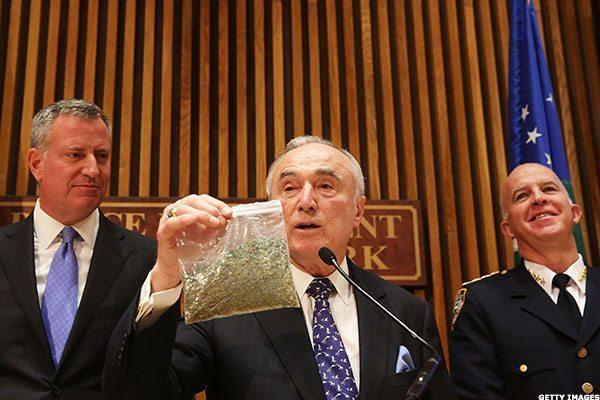WeedLife News Network
Hot off the press cannabis, marijuana, cbd and hemp news from around the world on the WeedLife Social Network.
6 minutes reading time
(1270 words)
Featured
These 8 States Are Likely Next for Marijuana Legalization

Andrew Meola ~ Main Street
NEW YORK (MainStreet) — The times, they are a-changin' for marijuana, as longtime prohibition laws risk going up in flames.

~
The New York Times advocated for legalization of pot at a national level last year, arguing that the "social costs" of the current prohibition laws are vast -- unreasonable prison sentences, a judicial system skewed against minority groups and the disadvantaged, the turning of law-abiding citizens into petty criminals.
While the road to legalizing and regulating marijuana use will not be one without challenge, The Times (the first mainstream media outlet to issue an opinion so strong) remains optimistic that creating the systems for the "manufacture, sale and marketing" of the drug are solvable problems.
Already, calls for legalization are growing louder, albeit at a state-by-state level rather than federal. Colorado was the first state to pass and implement legal marijuana laws with its first sale on January 1 this year; next was Washington which opened the doors to legal recreational pot stores on July 8. Meanwhile, in the rest of the country, grassroots activists fight and campaign, while politicians teeter on whether to relax laws.
According to a national survey by Pew Research Center earlier this year, 75% of Americans believe the sale and use of marijuana will eventually be legal nationwide, a majority opinion even among those who oppose its use.
The legislative momentum has already taken root. In the November vote, marijuana legalization initiatives passed in three of the four elections where cannabis reform appeared on the ballot. Voters in Alaska, Oregon and Washington, D.C. expressed their desire to legalize marijuana. Florida, the other state where there was a referendum to amend the state's constitution with regard to cannabis use, needed 60% of the vote to pass medical marijuana reform but garnered only 58%. (That near miss confirms the state's place on our list of states likely to see legalization ahead.)
It's a lucrative move for states to legalize the drug, too. Since Colorado embraced legalization, the state's coffers have gotten fuller. Colorado had generated nearly $11 million from tax and licensing fees on recreational marijuana sales and excise taxes as of June 9, according to a Denver Post published on that day.
Even President Obama has weighed in on the debate of whether or not to legalize. In an interview with The New Yorker earlier this year, Obama supported Colorado and Washington's legalization efforts but stopped short of making any statement on whether it could play out on a federal level.
"It's important for it to go forward because it's important for society not to have a situation in which a large portion of people have at one time or another broken the law and only a select few get punished," he told the publication.
The tide continued to turn in marijuana's favor in the midterm elections on November 4, as Alaska and Oregon approved the legalization and regulation of marijuana in a manner similar to alcohol for those age 21 or older and also allowed home cultivation. Washington, D.C. voters also approved an initiative to make it legal for adults to possess and grow limited amounts of marijuana.
The dominoes are stacked, but which will be the next to fall? TheStreet investigates the 8 states likely to next embrace marijuana law reform...
California
California had several local ballot initiatives on city and county ballots throughout the state in the midterm election. Most of the measures were targeted at improving local regulations, but some also wanted to restrict medical marijuana-related activity.
The Marijuana Policy Project has the results here.
Florida
In early May, the Florida House overwhelmingly voted in support of a bill to exempt patients with cancer and other severe conditions from criminal laws pertaining to the use of medicinal marijuana. The bill will allow limited access to cannabinol, or CBD, for treatment of such illness. Governor Rick Scott signed the bill on June 16.
The Florida ballot in the 2014 midterm election included an amendment on the legalization of medical marijuana thanks to a public petition campaign. The measure required 60% of the vote to pass, but voters struck it down 58% to 42%.
Maine
The Pine Tree State had local measures on the ballot in the 2014 midterm election in Lewiston and South Portland that would make possession of up to one ounce of marijuana legal for adults 21 years of age or older. The vote was 55% to 45% against in Lewiston, but 52% to 48% in favor in South Portland.
The measures also indicated support for regulating marijuana in a manner similar to alcohol at the state level.
Massachusetts
Massachusetts did not have any measures on the midterm election ballot with regard to marijuana, but it did pose a non-binding public policy question on the topic to some districts within the state.
"Shall the State Representative from this district be instructed to vote in favor of legislation that would allow the state to regulate and tax marijuana in the same manner as alcohol?" the question posed to certain districts.
The other districts asked for public opinion on "replac[ing] the state's restrictions on marijuana with a law that regulates the cultivation of and commerce in marijuana, by persons over the age of 21, in the same manner as laws that apply to the cultivation and sale of fruits, vegetables and herbs."
You can view the results at the Marijuana Policy Project.
Michigan
Michigan's midterm election ballot contained 11 local decriminalization measures for marijuana, and voters decided in favor of the measure in six of these areas. The full results are here.
Minnesota
Minnesota has one of the most restrictive medical cannabis laws but it's still a step forward. The legislation passed this year provides access to medical marijuana for a narrow scope of conditions, including cancer and epilepsy. The law authorizes the end products will only be available from a mere eight dispensaries statewide.
The passing of the bill was a compromise between House, Senate and Democrat Governor Mark Dayton, restricting use to those with the medical conditions covered by the law.
New Mexico
The Land of Enchantment had non-binding polling questions on decriminalization of marijuana in Bernalillo County and Santa Fe County in the midterm elections. Voters decided in favor by a tally of 57 to 42 in Bernalillio and 73 to 27 in Santa Fe.
New York
On July 8, Governor Andrew Cuomo signed the Compassionate Care Act, a law which allows doctors to prescribe non-smokable forms of marijuana to those with serious ailments, including cancer, AIDS, and Parkinson's disease.
A month earlier, the bill was passed by the State Assembly and Senate.
"There is no doubt that medical marijuana can help people," Cuomo said in a statement. "We are here to help people. And if there is a medical advancement, then we want to make sure that we're bringing it to New Yorkers."
~
Stay Informed
When you subscribe to the blog, we will send you an e-mail when there are new updates on the site so you wouldn't miss them.

